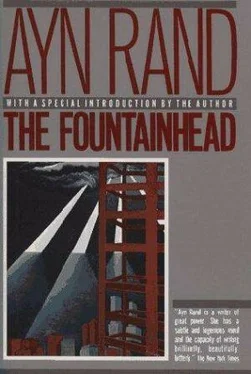The Dean's office looked like a chapel, a pool of dreamy twilight fed by one tall window of stained glass. The twilight flowed in through the garments of stiff saints, their arms contorted at the elbows. A red spot of light and a purple one rested respectively upon two genuine gargoyles squatting at the corners of a fireplace that had never been used. A green spot stood in the center of a picture of the Parthenon, suspended over the fireplace.
When Roark entered the office, the outlines of the Dean's figure swam dimly behind his desk, which was carved like a confessional. He was a short, plumpish gentleman whose spreading flesh was held in check by an indomitable dignity.
"Ah, yes, Roark," he smiled. "Do sit down, please."
Roark sat down. The Dean entwined his fingers on his stomach and waited for the plea he expected. No plea came. The Dean cleared his throat.
"It will be unnecessary for me to express my regret at the unfortunate event of this morning," he began, "since I take it for granted that you have always known my sincere interest in your welfare."
"Quite unnecessary," said Roark.
The Dean looked at him dubiously, but continued:
"Needless to say, I did not vote against you. I abstained entirely. But you may be glad to know that you had quite a determined little group of defenders at the meeting. Small, but determined. Your professor of structural engineering acted quite the crusader on your behalf. So did your professor of mathematics. Unfortunately, those who felt it their duty to vote for your expulsion quite outnumbered the others. Professor Peterkin, your critic of design, made an issue of the matter. He went so far as to threaten us with his resignation unless you were expelled. You must realize that you have given Professor Peterkin great provocation."
"I do," said Roark.
"That, you see, was the trouble. I am speaking of your attitude towards the subject of architectural design. You have never given it the attention it deserves. And yet, you have been excellent in all the engineering sciences. Of course, no one denies the importance of structural engineering to a future architect, but why go to extremes? Why neglect what may be termed the artistic and inspirational side of your profession and concentrate on all those dry, technical, mathematical subjects? You intended to become an architect, not a civil engineer."
"Isn't this superfluous?" Roark asked. "It's past. There's no point in discussing my choice of subjects now."
"I am endeavoring to be helpful, Roark. You must be fair about this. You cannot say that you were not given many warnings before this happened."
"I was."
The Dean moved in his chair. Roark made him uncomfortable. Roark's eyes were fixed on him politely. The Dean thought, there's nothing wrong with the way he's looking at me, in fact it's quite correct, most properly attentive; only, it's as if I were not here.
"Every problem you were given," the Dean went on, "every project you had to design — what did you do with it? Every one of them done in that — well, I cannot call it a style — in that incredible manner of yours. It is contrary to every principle we have tried to teach you, contrary to all established precedents and traditions of Art. You may think you are what is called a modernist, but it isn't even that. It is ... it is sheer insanity, if you don't mind."
"I don't mind."
"When you were given projects that left the choice of style up to you and you turned in one of your wild stunts — well, frankly, your teachers passed you because they did not know what to make of it. But, when you were given an exercise in the historical styles, a Tudor chapel or a French opera house to design — and you turned in something that looked like a lot of boxes piled together without rhyme or reason — would you say it was an answer to an assignment or plain insubordination?"
"It was insubordination," said Roark.
"We wanted to give you a chance — in view of your brilliant record in all other subjects. But when you turn in this — " the Dean slammed his fist down on a sheet spread before him — "this as a Renaissance villa for your final project of the year — really, my boy, it was too much!"
The sheet bore a drawing — a house of glass and concrete. In the comer there was a sharp, angular signature: Howard Roark.
"How do you expect us to pass you after this?"
"I don't."
"You left us no choice in the matter. Naturally, you would feel bitterness toward us at this moment, but ... "
"I feel nothing of the kind," said Roark quietly. "I owe you an apology. I don't usually let things happen to me. I made a mistake this time. I shouldn't have waited for you to throw me out. I should have left long ago."
"Now, now, don't get discouraged. This is not the right attitude to take. Particularly in view of what I am going to tell you."
The Dean smiled and leaned forward confidentially, enjoying the overture to a good deed.
"Here is the real purpose of our interview. I was anxious to let you know as soon as possible. I did not wish to leave you disheartened. Oh, I did, personally, take a chance with the President's temper when I mentioned this to him, but ... Mind you, he did not commit himself, but ... Here is how things stand: now that you realize how serious it is, if you take a year off, to rest, to think it over — shall we say to grow up? — there might be a chance of our taking you back. Mind you, I cannot promise anything — this is strictly unofficial — it would be most unusual, but in view of the circumstances and of your brilliant record, there might be a very good chance."
Roark smiled. It was not a happy smile, it was not a grateful one. It was a simple, easy smile and it was amused.
"I don't think you understood me," said Roark. "What made you suppose that I want to come back?"
"Eh?"
"I won't be back. I have nothing further to learn here."
"I don't understand you," said the Dean stiffly.
"Is there any point in explaining? It's of no interest to you any longer."
"You will kindly explain yourself."
"If you wish. I want to be an architect, not an archeologist. I see no purpose in doing Renaissance villas. Why learn to design them, when I'll never build them?"
"My dear boy, the great style of the Renaissance is far from dead. Houses of that style are being erected every day."
"They are. And they will be. But not by me."
"Come, come, now, this is childish."
"I came here to learn about building. When I was given a project, its only value to me was to learn to solve it as I would solve I a real one in the future. I did them the way I'll build them. I've learned all I could learn here — in the structural sciences of which you don't approve. One more year of drawing Italian post cards would give me nothing." '
An hour ago the Dean had wished that this interview would proceed as calmly as possible. Now he wished that Roark would display some emotion; it seemed unnatural for him to be so quietly natural in the circumstances.
"Do you mean to tell me that you're thinking seriously of building that way, when and if you are an architect?"
"Yes."
"My dear fellow, who will let you?"
"That's not the point. The point is, who will stop me?"
"Look here, this is serious. I am sorry that I haven't had a long, earnest talk with you much earlier ... I know, I know, I know, don't interrupt me, you've seen a modernistic building or two, and it gave you ideas. But do you realize what a passing fancy that whole so-called modern movement is? You must learn to understand — and it has been proved by all authorities — that everything beautiful in architecture has been done already. There is a treasure mine in every style of the past. We can only choose from the great masters. Who are we to improve upon them? We can only attempt, respectfully, to repeat."
Читать дальше










